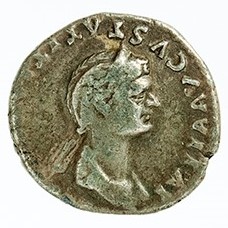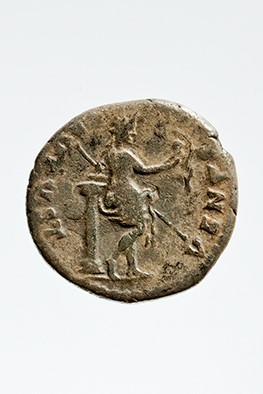Acquisition number: 1973.02
Obv.: Bust of Julia r., draped, diademed, hair in long plait at back. IVLIA AVGVSTA TITI [AVGVSTI F(ilia)].
Rev.: Venus, seen half from behind, naked to hips, standing right, right knee bent, resting left elbow on half-column, holding helmet in right hand and transverse spear in left hand. VENVS AVGVST(a).
Title: Denarius of Julia, reign of Titus - 1973.02
Acquisition number: 1973.02
Author or editor: Beryl Rawson
Culture or period: Roman Imperial
Date: c. AD 80
Material: Metal - Silver
Object type: Coins - Roman
Dimensions: 17mm (w)
Origin region or location: Italy
Origin city: Rome
Display case or on loan: 7
Keywords: Coin, denarius, Roman, Imperial, Julia, Venus
Seaby, H.A., Roman Silver Coins (London, B.A. Seaby, 1967) II 388, S2612, 14; Giard, J.-P., Catalogue des Monnaies de l’Empire Romain 3 vols (Paris: Bibliothèque Nationale, 1988-1998) Titus 106; Mattingly, H.,Coins of the Roman Empire in the British Museum, 6 vols (London, 1965) T141; Robertson, A. Roman Imperial Coins in the Hunter Coin Cabinet, University of Glasgow 5 vols (Oxford: Oxford University Press, 1962-1982) I 275 no. 1 and pl.48 Rome AD 80-81.
1973.02
Denarius of Julia, reign of Titus
2.632 g. c. AD 80
Obv.: Bust of Julia r., draped, diademed, hair in long plait at back. IVLIA AVGVSTA TITI [AVGVSTI F(ilia)].
Rev.: Venus, seen half from behind, naked to hips, standing right, right knee bent, resting left elbow on half-column, holding helmet in right hand and transverse spear in left hand. VENVS AVGVST(a).
(Flavia) Julia was the daughter of the emperor Titus. Titus was already divorced from Julia’s mother when he became emperor in AD 79. His daughter was very much the ‘first lady’ in his reign, and he conferred on her the title ‘Augusta’. She was also Domitian’s mistress and consort for part of his reign. She appeared on Domitian’s coins during her lifetime and, deified, after her death which occurred between AD 87 and 89. Julia was an important figure in the Flavian family cult, and was buried in the templum Flauiae gentis (temple of the Flavian clan). A statue of Julia (with Venus and Cupid) is celebrated by Martial (Epigrams 6.13), who praises Julia’s beauty. On this coin her heavy features are typical of the Flavian family: cf. her grandfather, Vespasian (1971.09), her father Titus (1973.23), and her uncle Domitian (1967.09). She cannot have been out of her teens when this coin was minted. Her hairstyles were elaborate, typical of the latter part of the first century. See Balsdon 256-257; and, for a different hairstyle, Breglia pl.XX.
Venus was associated with a number of empresses on Roman coins, sometimes as a figure of beauty and love, sometimes as the mother of the Roman race. Both these elements may be involved here, but the reverse figure is predominantly that of Venus Victrix, the goddess who brought success in war. (Titus’ arch, celebrating his victories in the Jewish War, was soon to go up in the forum.) Venus Victrix had been the protecting goddess of Julius Caesar and was inherited by Augustus. The use of this type, and Julia’s own name, are two of many attempts by the Flavian dynasty to associate themselves with the first imperial dynasty (the Julio-Claudian).
Coins of Julia are now rare.
Seaby, H.A., Roman Silver Coins (London, B.A. Seaby, 1967) II 388, S2612, 14; Giard, J.-P., Catalogue des Monnaies de l’Empire Romain 3 vols (Paris: Bibliothèque Nationale, 1988-1998) Titus 106; Mattingly, H.,Coins of the Roman Empire in the British Museum, 6 vols (London, 1965) T141; Robertson, A. Roman Imperial Coins in the Hunter Coin Cabinet, University of Glasgow 5 vols (Oxford: Oxford University Press, 1962-1982) I 275 no. 1 and pl.48 Rome AD 80-81.

